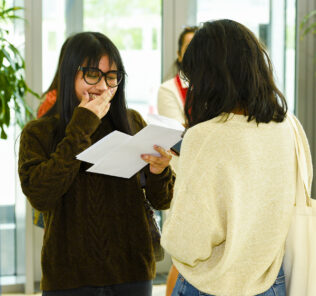What did we learn yesterday? Life is unfair.
Most of us knew this already, have been worn down by it – and are resigned to it. We probably should have fought harder in our lives to make it less unfair.
Young people, however, have had less time to learn this.
Thousands of young people woke up yesterday thinking they were A* students. One hour later they came away learning, according to the British government, they were morons. That is how many of them felt having been through their IGCSE or GCSE years during Covid – a grading system in which their teachers marked their course work based on accurate knowledge of them, rather than unknown teachers marking their exams without knowing them at all.
This, of course, hit girls far harder. Why? Exams work best for subjects in which there are few shades of grey. Boys tend to study for the objective subjects – including Mathematics and the Sciences. In subjective subjects, including many in the Social Sciences, and most in the Arts, grey is everywhere. These are subjects about passion, argument – and at their best, a battle for the soul of a subject. I can remember crying my eyes out with my teacher at school that the world had treated Shylock in the Merchant of Venice with abhorrent cruelty. He was a victim of an unjust world I felt – a good man, broken and corrupted by a stupid, evil society. The world, and my teacher, thought I was nuts – but that was not the point. The passion and capacity to argue, and make a case, mattered in Literature. By the way, I am a biological man. Not all men are good at Mathematics, would choose this subject over reading a good book wrapped in a duvet, or particular relate to the supposed archetype qualities of maleness like aggression and fighting wars.
So… we learned yesterday that:
- Life is unfair
- We are back to an exams-based system that favours boys at the higher grades where there are right and wrong answers.
- Exams, according to teachers, do not reflect the real gifts of our young people, particularly in subjects with shades of grey.
- During Covid, many young people did go to university with low grades in their A Levels – and went on to achieve As in their degrees. In previous years they would never have got to university. This proves, if nothing else, that some human beings, perhaps many of us, develop later.
- We also learned that many students, who went to university during Covid, dropped out. The Media, and right-wingers, tend to spin this as they were not bright enough and should never have gone. The truth is far more likely to be that the University experience during Covid was far from normal and the world around them was falling to pieces.
- We also learned just how arbitrary exams are at telling us anything remotely objective. Students in different parts of the United Kingdom had their Exam papers marked differently. In England, the UK government forced a drastic return to 2019 grading. Elsewhere, governments spread out the pain between this year and next. International students, and many in private schools in the UK, sit different versions of examinations. The net result is that a GCSE, or A Level, have always meant different things depending on where they are sat, by which board, when and by whom – and if you are male or female. Yet… the end result is the same A Level or GCSE. This is why comparing results in the UAE, with results reported in the UK, despite being part of the same British system, is an imperfect Science. This is why many students don’t get to go where they should, or could, be going.
- On that note, we learned, in the UK, that more and more students are choosing to study subjects like Psychology, Sociology and Economics. Mathematics has not yet been toppled as the most popular subject… but it may not be feeling so comfortable in its popularity at the top. Why? It’s hard to be certain, but arguably it’s because the world is an absolute mess and our young people, creditably, are looking for answers. They want to understand why the world is in a mess – and do something about it. Sociology, Politics, Economics, Philosophy, Psychology – these are subjects that promise understanding, if not answers. Mathematics probably has less to say about how to run an economy, manage climate change or be a good human being (even if it provides helpful tools to sort out the solutions).
We know this move to studying the subjective subjects is taking place in the UK. The situation is less clear in the UAE. Here there is culturally still a focus on Mathematics and the Sciences amongst large groups of students, but we can see change coming as the best schools increasingly are now broadening their subjects offer. Students in the UAE too are now questioning the world we live in and the mess adults have made of it.
Many of us will be breathing a sigh of relief. We messed up this world. We need, like never before, a younger generation inflamed by a sense of injustice, impassioned by the need for change – and one ready to find the solutions we all so desperately need.
What we learned yesterday is that change will and must come – but the exams system will have hindered more than it has helped.
© SchoolsCompared.com. A WhichMedia Group publication. 2023 – 2024. All rights reserved.











































































Leave a Response